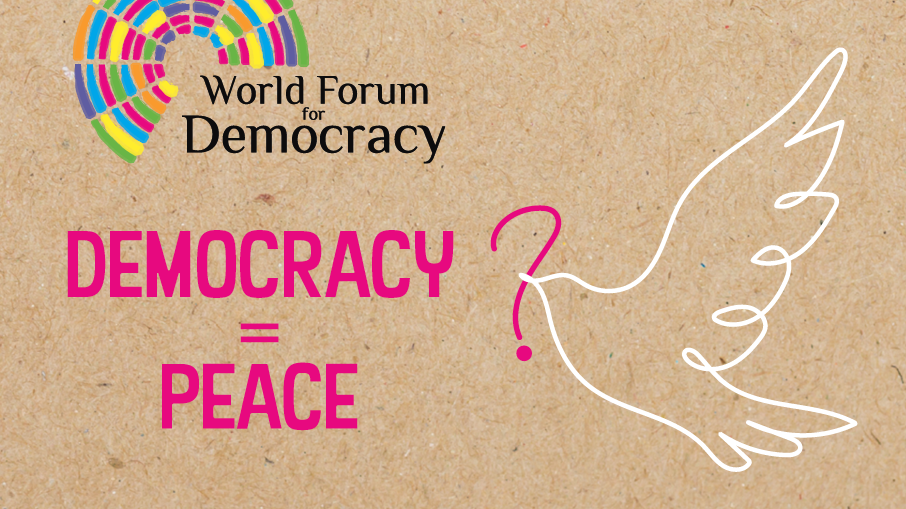World Forum for Democracy 2023
Democracy = Peace?
Strasbourg, 6-8 November 2023

Armed conflicts, however, had never ceased to be a recurring threat in the world. The post Second World War vision of peace and prosperity, underpinned by democracy, never fully delivered. In the twenty-first century, the question is still open whether this vision can fulfill its promise.
At a time when violence rages, inequalities are widening, and politics is polarising - and when governments are struggling to cope with unforeseen events including climate change, pandemics and the rise of new technologies- now is the time to ask: can democracy deliver peace?
 Democracy untended?
Democracy untended?
The idea that democracy is a guarantee of peace is widely shared, but is today under threat. Have democracies adapted themselves to face the risks which are themselves evolving? While some of the most terrible aspects of war remain, the nature of conflict has also changed with the use of drones, cyber-warfare and the deployment of nearly imperceptible propaganda across social media. For peace to be a real force to be reckoned with, it must itself be waged with conviction. But how? Should we not cultivate democracy in our daily practices, in education, the workplace, our civic, sporting life, etc? Shouldn’t the values of democracy, and the institutions which support them, be closely reflective of the real experiences and aspirations of the citizens who cherish them? Women and children are too often the tragic face of war’s devastation, but their voices are rarely heard in the political debates, peace negotiations and peace-building processes. If democracy and peace are processes or a way of life, then there is surely a need to cultivate the knowledge, skills and competencies necessary for people to actively engage, participate and contribute to its survival. But how? Can we teach peace?
 Peaceful Societies?
Peaceful Societies?
Injustice and inequality are themselves a perpetual source of conflict. Democracies have delivered the highest standards for human and civil rights in our history. The impressive rise in living standards in the last decades has meanwhile been accompanied by rapidly growing income and wealth disparities. Social and economic rights are therefore now at the centre of debates. In some democracies poverty is increasing, and many citizens feel that their societies are sliding backwards. Is this in and of itself, a threat to peace? Is the peaceful society not only a society without war, but also one where citizens live with the peace of mind that comes with security and opportunity? How do we get there? How to avoid that the wounds of the past become the source of injustice in the present; that remembrance serves not only to reduce conflict, but also to build durable peace? Can democracy's particular assets such as equality, citizen participation, the rule of law, freedom of expression, be put to better advantage in the waging of peace?
 International Communities for a Democratic Security?
International Communities for a Democratic Security?
Economic, political and rights-based partnerships such as the European Union and the Council of Europe have been instrumental to ensuring peace for their democratic member states. So too have defence alliances. But when conflict rages in so many parts of the world, why hasn’t the multilateral model succeeded more broadly? Should international organisations be redesigned? Is there a model for multilateral association which is both deep in its mutual obligations and broad in its inclusiveness and scope of action? Might the rise of cross-border communities of other kinds, often citizen-led and facilitated by technology, be another route to preventing conflict? The fact remains that democratic security is today the most decisive factor of peace; how to define it, build it and defend it?
